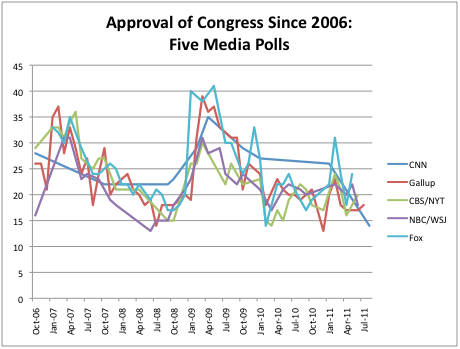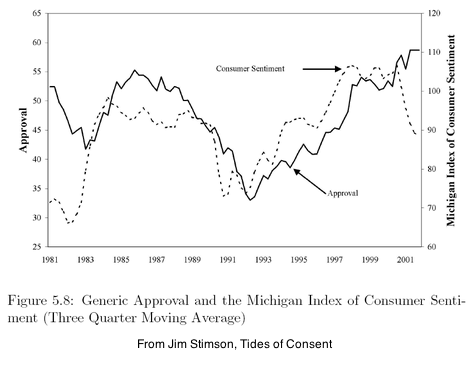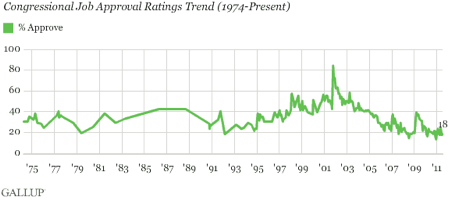
This article has been updated to include a new New York Times/CBS News poll released Thursday night.
WASHINGTON -- The new CNN/ORC International poll conducted Monday night shows congressional job approval falling to or matching record low levels. Scholars who have studied decades of public opinion data argue that these ratings mostly reflect the condition of the economy, so members of Congress who want to turn the numbers around need to focus on making the economy grow.
The CNN poll, conducted just after the announcement of this week's debt ceiling agreement between President Obama and congressional leaders, finds approval of Congress falling to just 14 percent, down sharply from 26 percent in January. The new result represents the lowest congressional approval rating measured by the CNN/ORC poll since its inception in 2006.

This poll was followed Thursday night by a New York Times/CBS News poll which also shows Congress' approval rating falling to 14 percent, with a record 82 percent of Americans now disapproving of the way Congress is handling its job -- "the most since the Times first began asking the question in 1977, and even more than after another political stalemate led to a shutdown of the federal government in 1995," the Times writes.
Strictly speaking, these new results are not the "lowest ever" for Congress, but they come close. Congressional approval as measured by a half dozen or more media polls has been trending downward since 2009, and also hit a similar low in the second half of 2008. Gallup found congressional approval as low as 14 percent in March 2010 and the CBS/New York Times poll tracked approval as low as 14 percent in the same month and at 12 percent in October 2008. As noted by Political Wire, Gallup also found congressional ratings falling below 20 percent in March 1992 (18 percent) and June 1979 (19 percent).
Can Congress do anything to reverse the trend?
The short answer is, other than stimulating an economic resurgence, not much, according to scholars. "Approval of Congress tracks the economy quite closely," said John Sides, a professor of political science at George Washington University, via email. "The simplest thing that members of Congress can do to improve their public standing is stimulate the economy."
Sides pointed to research published in the book "Tides of Consent" by University of North Carolina political scientist Jim Stimson, that shows how closely all approval ratings, including ratings of the president, senators and governors, track with the Michigan Index of Consumer Sentiment. When Americans feel positive about the economy, ratings of elected officials go up. When the economy is in the doldrums, elected officials' ratings plummet.

Brendan Nyhan, a political scientist at Dartmouth College, said he agrees that the economy is crucial to approval ratings, but added a note of caution: "Most economists aren't expecting the debt ceiling deal to boost growth," he wrote via email, citing the recent growth projection by JP Morgan. "So it's unlikely that congressional approval will improve substantially anytime soon."
The economy is not the only source of low congressional approval ratings. David R. Jones, a professor of political science at Baruch College and author of a book on how Americans evaluate Congress, told The Huffington Post that there are two other factors at work. Americans don't like "the way Congress goes about doing its business," he said, "in particular, its inefficiency and its conflictual nature." He said Americans also pay attention to the ideological direction of Congress and that individual voters will downgrade their approval rating "if they feel that Congress is too distant from their own policy preferences."
Jones argued that the current environment has produced a "confluence of those three factors." The economy is bad, the debt limit debate put Congress' dysfunction "on display non-stop for the last several weeks" and many Americans are likely feeling more distant than ever from the ideologies and policies they associate with Congress.
Do these very low congressional approval numbers forecast "a political cataclysm of epic proportions," as the Washington Post's Chris Cillizza puts it?
Scholars differ on the answer to this question. In a blog post in early 2010, Emory University political scientist Alan Abramowitz argued that "discontent with Congress does not lead to a general tendency to kick out incumbents." He told HuffPost via email that his "basic view on this hasn't changed." Congressional job ratings "have little political significance because they don't translate into votes for or against either party or incumbents in general," he said. The more consequential measure, he said, is the president's approval rating. "If Obama is unpopular next November, Democrats will take a beating no matter how unpopular Congress is."
Jones has a slightly different perspective. His research focused less on predicting winners and losers and more on the margins of victory in congressional races. By studying approval ratings measured between 1976 and 2006, Jones found that low approval ratings for Congress as a whole tended to reduce the electoral margins of majority party incumbents and increase margins for minority party incumbents.
Jones said he agrees with Abramowitz that Obama's approval ratings will probably matter more than congressional approval in 2012 House race outcomes. Jones argued, however, that history shows voters assume "some shared responsibility in a period of divided government," which may mitigate potential Democratic losses. "You're going to see voters kind of conflicted. They're not just out to punish Democrats, they're also not very happy with Republicans," he said.
Sides, Nyhan, Jones and Abramowitz all agreed that improvements in congressional approval ratings hinge on one thing: the economy.


